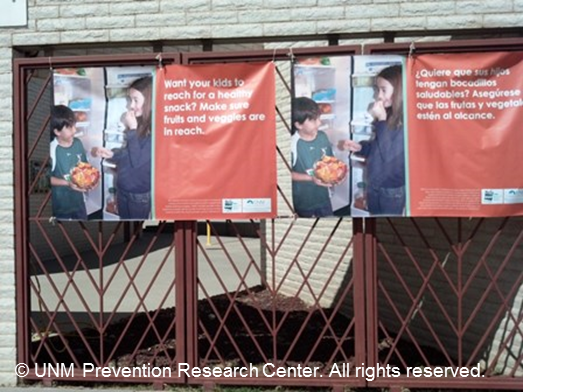The Eat Smart to Play Hard social marketing initiative is based on insights gathered from the priority population before it was developed. The strategic marketing plan was created after several years of formative research. During Phase I of the formative research, we conducted six focus groups in Spanish in urban and rural areas of New Mexico to get to know the audience and to understand their barriers to achieving good nutrition, as well as their perceptions of its benefits. In Phase II, participants in eight focus groups had the opportunity to give their feedback about USDA Food and Nutrition Services (FNS) core nutrition messages and supporting content in Spanish. They were asked about the use of specific words in Spanish and if the messages resonated for them. Participants, including both children and adults, were then asked to design a campaign that appealed to them and that they would be likely participate in.
The focus groups were conducted in Spanish with parents of preschool-age children, parents of elementary school-age children, and children who were 8- to 10-years old. Based on the feedback from the focus groups, we developed and pre-tested materials, made modifications to them, and tested them again during Phase III. This phase involved evaluating different strategies to find the approach that would speak best to our audience in order to effectively increase consumption of fruits and vegetables. This is how Eat Smart to Play Hard was created. The entire Eat Smart to Play Hard Campaign, which was pilot tested in 2015 in an urban community, is now being expanded to rural communities across New Mexico.
-

SNAP-Ed New Mexico Social Marketing Project Phase II Report
Sally M. Davis, Glenda Canaca, Jose Canaca, Mary Hanrahan, Julia Meredith Hess, and Danielle P. Parker
-

SNAP-Ed New Mexico Social Marketing Campaign Phase 1 Focus Groups Report
Sally M. Davis, Glenda Canaca, Jose Canaca, Patty Keane, Pamela Monaghan-Geernaert, and Mary Hanrahan
The purpose of the SNAP-Ed New Mexico Social Marketing Campaign is to develop and evaluate culturally appropriate nutrition education intervention messages in Spanish for parents and care-givers of preschool age children, parents of elementary school-age children, and children ages 8-10 years. In collaboration with HSD, the University of New Mexico Prevention Research Center (PRC) set out to develop and test messages to effectively motivate SNAP participants who do not currently meet U.S. Dietary Guidelines recommendations for consumption of fruits, vegetables, whole-grains and low-fat dairy to increase their intake of these foods. This is a three phase project. Phase one of the project was the planning phase and consisted of conducting focus groups with Spanish speaking SNAP eligible individuals to identify the concepts in which the messages for this specific population would be based. This formative research phase was carried out from January 2010 until June 2011.

